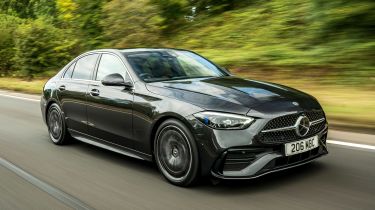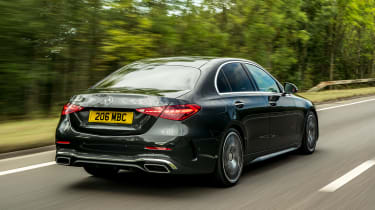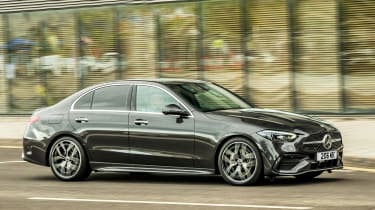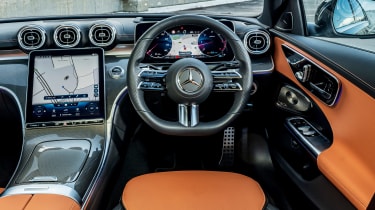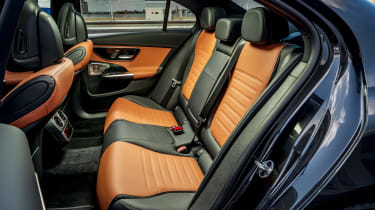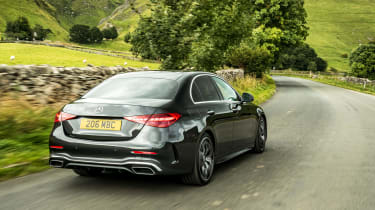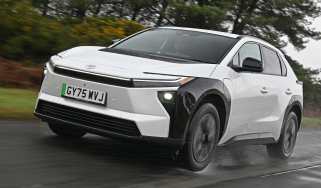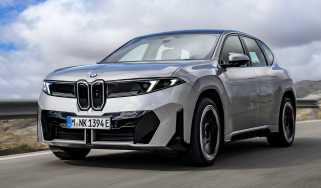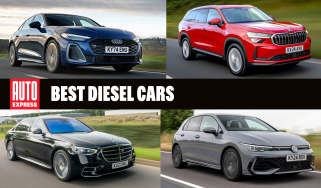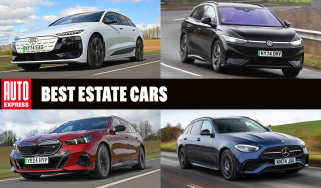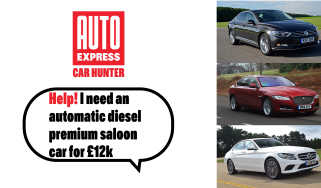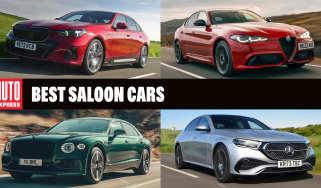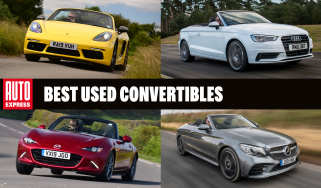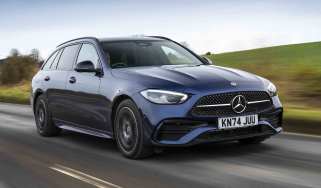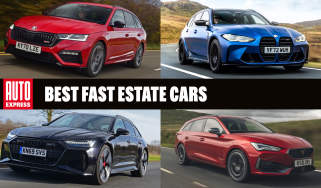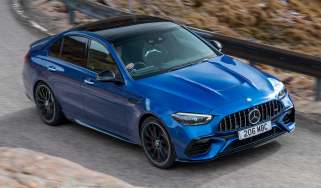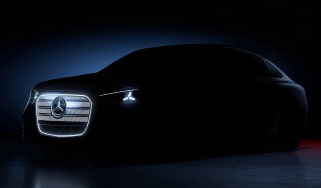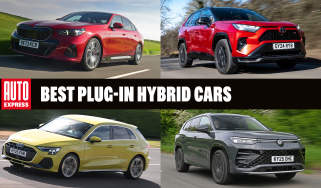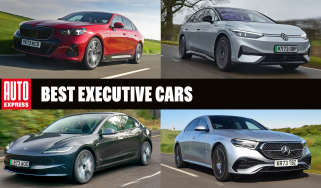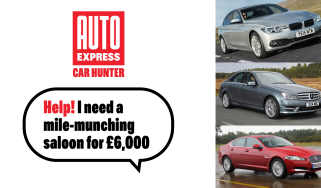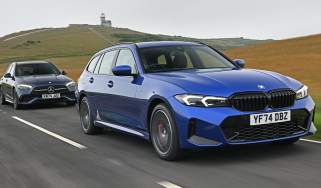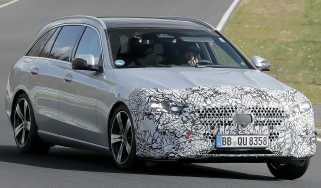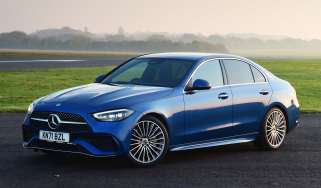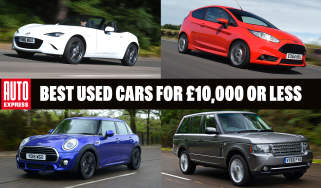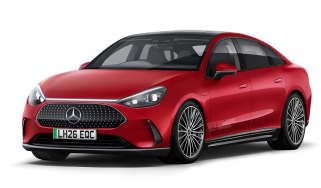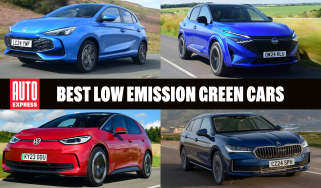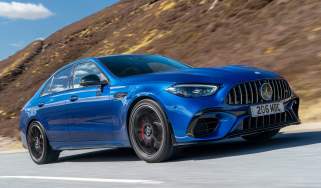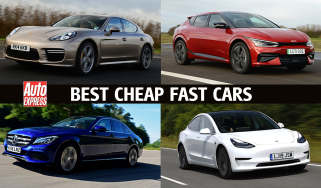Mercedes C-Class review
A quality interior, great efficiency and strong on-board tech mean that the Mercedes C-Class is a hugely impressive compact executive saloon

Our opinion on the Mercedes C-Class
The latest Mercedes C-Class saloon has given buyers looking for a compact executive car much to think about. It offers sharp styling, heavily inspired by its bigger E-Class sibling, outstanding levels of comfort and strong on-board technology. The exceptional interior quality also puts much more expensive models to shame.
If you factor in the improved efficiency of the mild-hybrid petrol and diesel versions, not to mention the plug-in hybrid C 300 e’s pure-electric range of just over 70 miles, the C-Class makes a compelling case for itself and should be one to consider.
| Key specs | |
| Fuel type | Petrol, Diesel, PHEV |
| Body style | Compact saloon |
| Powertrain | 1.5-litre turbocharged petrol, rear-wheel drive 2.0-litre turbocharged petrol, rear-wheel drive 2.0-litre turbocharged petrol PHEV, rear-wheel, drive 2.0-litre turbocharged diesel, rear-wheel-drive 2.0-litre turbocharged diesel PHEV, rear-wheel drive |
| Safety | 5-star Euro NCAP (2022) |
| Warranty | 3yrs/unlimited miles |
About the Mercedes C-Class
Over recent years, the popularity of traditional petrol and diesel saloon cars like the Mercedes C-Class has been on the wane. High-riding SUVs continue to capture the hearts of buyers, and it’s a trend that hasn’t been lost on Mercedes. The brand has redoubled its efforts with the latest C-Class to deliver improvements across key areas to help it stay competitive. Exterior styling, on-board tech, ride and comfort have all been thoroughly revised, while the most appealing update for cost-conscious buyers will be the introduction of mild- and plug-in hybrid models.
The C-Class engine range is made up of four-cylinder petrol and diesel units, all featuring 48-volt mild hybrid assistance to help improve efficiency. The entry C 200 has a 1.5-litre petrol powerplant developing a healthy 204bhp, although you can upgrade to the more potent 2.0-litre C 300 with 258bhp. Diesel power for Mercedes’ executive saloon consists of the 197bhp C 220 d, and the C 300 d which produces 265bhp. All use a nine-speed auto gearbox as standard.
Used - available now

2018 Mercedes
C Class
40,400 milesAutomaticPetrol2.0L
Cash £14,328
2018 Mercedes
C Class
74,994 milesAutomaticPetrol2.0L
Cash £12,156
2019 Mercedes
C Class
57,829 milesAutomaticDiesel2.0L
Cash £18,781
2026 Mercedes
C Class
37,888 milesAutomaticPetrol2.0L
Cash £24,420By far the most efficient models in the C-Class line-up are the C 300 e petrol plug-in hybrid and C 300 de diesel plug-in hybrid which, provided you regularly top up the 25.4kWh battery, should drastically cut down on visits to the fuel station.
Mercedes has kept the trim line-up for the new C-Class pretty straightforward and easy to understand: the old entry-level Sport specification is no longer available, so the entry point to ownership is now the popular AMG Line trim, which can be upgraded with Premium and Premium Plus packs. There's also an Urban Edition, which focuses on comfort as opposed to the AMG Line's sporty feel.
Mercedes C-Class prices and latest deals
Prices for the Mercedes C-Class start from just over £46,000 for the 1.5-litre petrol car in AMG Line trim, rising to over £62,000 for the plug-in hybrid C 300 de in AMG Line Premium Plus. Opt for one of the full-fat Mercedes-AMG models, though, and prices can exceed £100,000.
All models are currently available via our Buy a Car service, where you can find a new Mercedes C-Class with savings of up to £6,500.
Engines, performance and drive
The latest Mercedes C-Class uses a heavily revised version of the previous model’s MRA architecture. This set-up also supports the new luxury S-Class, with the smaller compact executive benefiting from an overhauled suspension system and improved ride comfort.
All models in the C-Class range include 48-volt mild-hybrid assistance, which uses an integrated starter/generator that recoups energy lost under braking. The system then uses the small electric motor to help boost the efficiency of the combustion engine when you accelerate. It sounds a little complicated, but the tech works away unobtrusively out on the road, allowing you to focus on driving.
We’ve tried the C 220 d mild-hybrid model and found it an incredibly smooth drive: with 440Nm of torque available from 1,800rpm, the C-Class was able to effortlessly shift up to higher motorway speeds and remained relatively quiet and composed under harder acceleration.
There are five individual driving modes to choose from: Comfort, Eco, Sport, Sport+ and Individual. Each mode is tailored to suit a particular driving preference, with the softer Comfort setting being our choice for everyday driving. Eco mode adjusts the throttle, climate control and other settings to help reduce overall fuel consumption, while also automatically shutting off the engine when you come to a standstill.
Switching to Sport and Sport+ means you’ll benefit from sharper steering and throttle responses, along with a firmer suspension set-up; a better option if you’re taking on a twisty B-road. The nine-speed auto transmission works intuitively and isn’t often caught out, although when we tried the plug-in model we found the hybrid system required a little moment before catching on that we were looking for a lower gear.
Mercedes has managed to improve the C-Class’s dynamic performance, but it still doesn’t trouble a BMW 3 Series for driving fun. Keen drivers will find that the brakes don’t offer enough feel and the steering could be more communicative, despite the various drive modes on offer.
0-62mph acceleration and top speed
Outside of the sporty AMG-tuned models, the performance crown goes to the C 300 d which manages a 0-62mph time of 5.7 seconds and a 155mph maximum.
The petrol C 300 isn’t far behind, sprinting from 0-62mph in 6.0 seconds flat, with the plug-in hybrid model just a tenth slower.
| Model | Power | 0-60mph | Top speed |
| Mercedes C 200 | 204bhp | 7.3 seconds | 153mph |
| Mercedes C 300 | 258bhp | 6.0 seconds | 155mph |
| Mercedes C 300 e | 313bhp | 6.1 seconds | 149mph |
| Mercedes C 220 d | 197bhp | 7.5 seconds | 152mph |
| Mercedes C 300 d | 265bhp | 5.7 seconds | 155mph |
| Mercedes C 300 de | 313bhp | 6.2 seconds | 149mph |
MPG, CO2 and running costs
Private buyers and business users will find it hard to ignore the cost savings to be had from running a C-Class plug-in hybrid model, compared with a conventionally-powered petrol or diesel car.
The C 300 e offers a claimed 68 miles of all-electric drive, with a top speed of 87mph in battery mode, so it’s quite possible that you could take on the daily commute without ever needing to fire up the combustion engine - as long as you get into the routine of regularly charging the battery. Mercedes has even equipped its plug-in models with a 55kW charging capability, which is a faster rate than you’d normally find in other PHEVs, so replenishing the 25.4kWh battery from 0-100 per cent can take as little as 30 minutes.
Company car drivers will also benefit from a big reduction in Benefit-in-Kind (BiK) tax, with the C-Class plug-in models falling into sub-10 per cent brackets. In comparison, the C 200 and C 300 petrol cars are 20-25 per cent higher, which means you’ll pay a whole lot more to HMRC if your compact exec comes without plug-in power.
Diesel models fare a little better for tax, and they also return better fuel economy: the C 220 d with up to 62.8mpg on the WLTP combined test cycle and the C 300 d averaging 54.3mpg.
With the petrol C 200 and C 300 only able to manage around 40-44mpg, but costing around £1,000 to £2,000 less to buy than the equivalent diesel, you’ll have to work out which option best suits your circumstances and offers the best value.
Insurance group
Insurance group ratings for the latest C-Class remain similar to the previous model and range between the 30s and 40s. The cheapest C-Class to insure is the entry-level C200 in AMG Line trim, which sits in group 38. Unsurprisingly, the C43 AMG performance car is the most expensive, as this resides in group 44.
Depreciation
Our expert data indicates that all but the AMG variants of the fifth-generation C-Class should retain between 50 and 53 per cent of their initial value over a period of three years and 36,000 miles. The C43 AMG still fares reasonably well though, and should retain between 48 and 49 per cent over the same ownership period.
To get an accurate valuation on a specific model check out our free car valuation tool...
Interior, design and technology
With serious competition from stylish SUVs and the clean-sheet designs of modern all-electric rivals turning the heads of potential buyers, Mercedes decided that a significant overhaul was necessary in order to keep up the appeal of its compact executive car.
Based on a heavily reworked version of the previous model’s Modular Rear Architecture (MRA) platform, the latest C-Class is bigger than before, although it has a lower roofline which helps to create a more purposeful, sportier stance. It’s a good looking car that takes design cues from its bigger E-Class sibling, such as the twin power bulges in the bonnet and the stronger shoulder lines.
It’s a look which should hold your attention and hopefully draw you to the interior, where the real improvements are clear to see. Plush materials and a first-class fit and finish to the cabin feel suitably premium, while the view forward from the driver’s seat is like sitting in a junior S-Class limo. The clean dashboard layout is dominated by a huge 11.9-inch infotainment screen, while a 12.3-inch digital instrument display is standard for all models.
Standard kit includes 17-inch alloys, the Dynamic Select drive mode system, cruise control, dual-zone climate control, heated front seats, leather upholstery, a reversing camera and a wireless smartphone charging function.
The AMG Line specification is now the entry point into the range, but it’s still where most executive buyers will put their money because, as with BMW’s M Sport trim, it’s become a bit of a badge of honour in the company car park. The 18-inch AMG alloys, body kit, rear privacy glass and chrome accents generate a subtly aggressive look for the C-Class.
Upgrading to the Premium and Premium Plus versions adds bigger 19-inch wheels and extra tech such as a 360-degree camera system, a head-up display and four-zone climate control, along with a panoramic sunroof.
Sat-nav, stereo and infotainment
The latest MBUX set-up in the C-Class borrows tech from the S-Class limousine and even in this company, it feels incredibly slick. The 11.9-inch portrait display is standard on all models and it looks fantastic.
Functions are displayed three at a time on the intuitive main menu, with further options available by swiping left or right on the responsive touchscreen. Sat-nav destinations are easy to input thanks to a large on-screen keyboard, and routes load faster than in either rival. While there aren’t any physical climate controls, the large on-screen keys are easy to read, so it isn't too fiddly to adjust.
If you get lost in a deep sub-menu, the home page shortcut remains on screen, so it’s easy to get back out.
A driving-assist button is one of few physical keys, so you can toggle between various systems quickly
Practicality, comfort and boot space
Once sat in the driver’s seat you can really start to appreciate the comfort on offer in the C-Class. Comparisons to the S-Class luxury limo are not without merit, with AMG Line models featuring Artico leather upholstery, heated seats and climate control, along with the Seat Comfort pack which provides increased electric adjustment to enable you to find the perfect seat position.
The C-Class isn’t all style without substance, though, and there are plenty of useful practical touches included to help make life a little easier from behind the wheel. The standard reversing camera will help with tricky parking manoeuvres, while Premium cars come equipped with a 360-degree camera and an Active Parking Assist system which does most of the hard work for you using its clever radar tech and sensors.
Other kit such as the MBUX voice-controlled multimedia system, helps you to concentrate fully on the road, and there’s further scope to add equipment like a head-up display and an augmented reality function for the sat-nav.
Dimensions and size
The fifth-generation C-Class is a bigger car overall than the model it replaced. Mercedes’ executive saloon has increased in length 4,793mm and 10mm extra in width to 1,820mm, although it sits 7mm lower. The wheelbase has grown by 25mm too, which helps provide a little more room in the cabin.
| Model | Mercedes C-Class | BMW 3 Series | Audi A5 |
| Length | 4,793mm | 4,714mm | 4,829mm |
| Width | 1,820mm | 1,827mm | 1,860mm |
| Height | 1,446mm | 1,440mm | 1,444mm |
| Wheelbase | 2,865mm | 2,850mm | 2,900mm |
| Boot space | 455 litres | 480 litres | 445 litres |
Leg room, head room & passenger space
Room up front in the C-Class is good for both the driver and passenger, while those travelling in the back benefit from more head and knee room. Four adult occupants can be accommodated with ease, with an extra fifth passenger in the back perhaps best left for shorter journeys. The estate model offers a little more head room up front, but a full 30mm over the saloon in the rear of the cabin.
Boot space
At 455 litres, the C-Class’s boot falls short of the 480-litre space found in the BMW 3 Series, but beats the 445 litres on offer in the Audi A5. Regardless, the Mercedes should be practical enough for most needs. Again, the estate model offers extra capacity with a 490-litre load space, which increases to 1,510 litres with the rear seats folded.
Towing
All C-Class models have a braked towing capacity of 1,800kg, which should be more than enough for most day-to-day needs.
Reliability and safety
The C-Class was tested by Euro NCAP in 2022, and it achieved a full five-star safety rating. A wide range of standard safety equipment helped towards this score, with all C-Class models featuring a blind spot monitoring system, lane-keeping assistance, an autonomous emergency braking function and Attention Assist which detects driver fatigue on a longer journey and alerts you to take a break.
Mercedes has also taken pedestrian safety into account by fitting its Active Bonnet tech to the C-Class: if an imminent collision is detected, the bonnet raises up to create a cushion between itself and the engine, helping to prevent injury to the pedestrian.
Warranty
Mercedes offers a three-year, unlimited mileage warranty for its C-Class, with an option to take out extended cover for a further 12 or 24 months at extra cost. Alternatively, a one-month rolling contract is also available.
Servicing
The Mercedes ServiceCare plan allows you to spread servicing costs into monthly payments, or settled upfront as a one-off payment. Prices start from £38 per month.
| Euro NCAP safety ratings |
|
Buying
Mercedes C-Class alternatives
Competition to win over buyers in the executive saloon market is stronger than ever. The C-Class still has the usual BMW 3 Series and Audi A5 to contend with, but rivals from further afield are hotting up, too. The Alfa Romeo Giulia and Jaguar XE both look fantastic and are great fun to drive, while Korean luxury brand Genesis also offers an intriguing alternative with its G70.
Pure-electric models offer further opposition to the executive saloon establishment, with models such as the Hyundai Ioniq 5, Kia EV6 and Polestar 2 all delivering low running costs and eye-catching looks. The Tesla Model 3 also has a level of brand appeal that’s strong enough to meet the C-Class head on.
What do owners think
Over the years most C-Classes have been very well received, but the feedback in 2025 was exceptionally strong. As well as appreciating the Merc’s good value, its owners rate practicality very highly, with fifth and sixth places for cabin storage and child-friendly features, while flexible seating and luggage space are ranked 11th and 12th. Exterior style is rated an excellent fifth, with interior design just behind in 12th. On the road, the C-Class’s supple ride and driving pleasure are the best-rated attributes, although road handling is 39th.
That position is the C-Class’s worst, although this is also where servicing costs are ranked. Fuel economy comes 27th and the steering 26th, but all other scores are in the top half of the table. However, the quality
of the exterior finish is in 23rd, which is disappointing; the interior quality fares better in 16th. Many other aspects have top-10 scores including front-seat comfort (eighth), all-round visibility (sixth), phone connectivity (third) and the functioning of the safety systems (fifth), while the built-in nav comes sixth.
| What owners said |
| “When I first saw the car, I fell in love with its exterior design and the interior. The comfort and refinement are great too.” |
| “Everything about the car is impressive, from the design to the performance. There is nothing that I dislike about my Mercedes.” |
| “I like the luxurious interior, smooth ride, advanced safety features, strong performance and elegant design. A perfect package.” |
| “It’s one of Merc’s smaller saloons, but it’s easy to make comparisons with the S-Class. The C-Class is like a shrunken limousine.” |
| “I tried most of the compact premium estates, and none of them had an infotainment system as easy to use or as appealing as the Mercedes. I just wish there were real buttons for the climate control, for easier adjustment on the move.” |
| “My C-Class regularly carries four adults, including me as the driver, and I’ve had five in there with no problems over shorter journeys. My saloon’s boot easily swallows luggage for four people on a week’s holiday.” |
| “The interior is luxurious and well designed, with high-quality materials and comfortable seating. I also like the digital cockpit, infotainment system and driver-assist features that make living with my C-Class safer and more convenient.” |
| “What I dislike most about my C-Class is the high cost of maintenance. Insurance is pricey too, but fuel bills aren’t too steep.” |
| “I really enjoy the driving experience of my C-Class. The car delivers a smooth, taut drive and is very refined at motorway speeds. I like the five driving modes, so I can pick the right one for any occasion.” |
Used and nearly new Mercedes C-Class
Buying a used Mercedes C-Class means you'll benefit from superb comfort, decent levels of kit and a classy looking interior. Nearly new cars will still be relatively expensive to buy, while the C-Class can be pretty costly to run, with insurance premiums and servicing costs reflecting the fact that it's a premium compact executive car.
There should be lots of examples to choose from as the C-Class has always sold well in the UK, but make sure, as ever, that your purchase comes with a good history and evidence of servicing and maintenance.
Mercedes C-Class history
Mercedes C-Class Mk4: 2014-2021
The Mk4 Mercedes C-Class will definitely appeal to those looking for a capable compact executive car. Available as either a saloon, estate, coupe or convertible model, the C-Class offers a sense of style and relatively-affordable luxury that more mainstream rivals such as the Ford Mondeo and Volkswagen Passat just can't match.
The C-Class range was given a refresh in 2018 where, alongside some subtle exterior tweaks, new C300e petrol and C300de diesel plug-in hybrids were introduced offering improved fuel economy and tax savings for company car drivers. Read our full Mk4 Mercedes C-Class buyer’s guide here…

